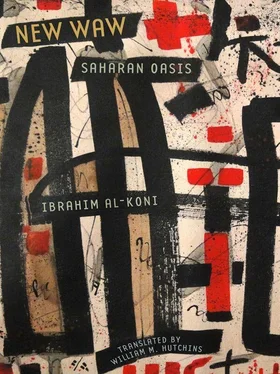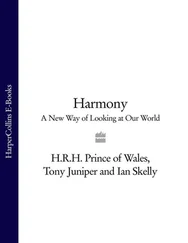But the poor man broke after almost three weeks. The youngsters said that with their own ears they heard him ask for a crust of bread.
After this the man sent for the noble elders and informed them that he had restored the lost memory of the tribe’s diviner and that they simply needed to supervise his nutrition if they wanted to restore him to his former state.
Emmamma was incredulous. He sat on his haunches before the frail body, raising his knees and thighs, and leaned forward till his turban touched the diviner’s. He asked, “Do you know me? Swear by the goddess Tanit if you really recognize me.”
The diviner lowered his eyes to hide the smile in them and said in a low voice like the whispers of lovers, “Do I need to swear by the lords of the Spirit World to recognize our revered master Emmamma?”
Emmamma clapped his hands and turned to the assembly of sages. He released a heroic shout louder than any that the tribe expected to come from the mouth of a venerable elder. He slapped his scrawny thighs, which resembled dry sticks, and repeated with childish glee, “Bravo! Bravo! Beat the drums of glad tidings, tell the maidens to fill the desert with their trilling, and slaughter … slaughter sacrificial beasts at once!”
He hugged the diviner and held him in his arms a long time. When he released him to allow the other elders to embrace their longtime comrade, everyone saw the tears in his eyes.
4
Emmamma said, “We missed you a lot.”
Aggulli concurred, “Your absence seemed to last forever. We have grown accustomed to living with the absence of someone who has left us to travel far away; we haven’t grown accustomed to enduring a yearning for a person whom we can see with our eyes but who doesn’t hear our voice or answer our call.”
Amasis exclaimed, “What a grim loss this was!”
The diviner responded, “I won’t conceal from you that I missed you too. Had I not enjoyed the leader’s company, my regret at losing you would have been even greater.”
Everyone was still; the sages exchanged covert glances. Emmamma was the first to inquire in a voice that was somewhat disapproving, “Did you say ‘the leader’?”
The diviner answered earnestly, “Yes. I traveled to the Western Hammada at the leader’s invitation.”
Everyone was apprehensive and quiet again. People hid their reaction by looking down at the earth. The venerable elder asked, “Did you mention traveling to the Western Hammada?”
“Yes, Master. The leader took me on a trip to the Western Hammada to search for rainfall from passing clouds. We found there a springtime that no eye has seen and that you all would never have imagined. I don’t know why you cling to a life of drought in the Eastern Hammada and ignore springtime in the West, which you will never consider.”
He fell silent and stared at the celestial void. Then he toured the horizons and rushed off through the eternal expanse. When he spoke again it was in a whisper, “I expressed my astonishment about this matter. Then our master told me that this is always the way with desert people. They enjoy an arid climate, because that’s all they’ve ever known. They turned away from the orchards, because they have never gotten used to traveling West and have never known what the great expanse there conceals. I won’t hide from you that I intend to return there once I have paid off my debts and discharged my worldly duties.”
The venerable elder was the first to express his shock: “What are you saying? Have you returned to our domiciles or do I find you still traversing the encampments of forgetfulness? Don’t you know that our scouts explored the Western Hammada inch by inch and returned two days ago, advising us that the earth there is scorching hot and that the rocks are almost molten and turning to ash on account of the fiery heat?”
He continued to roam through the remote distance, which was draped by the mirage. Then he observed in the same voice reminiscent of lovers whispering, “I don’t know which hammada your scouts are describing, but I doubt that their feet ever trod the earth of the Western Hammada.”
The elders stopped digging in the dirt and cast the diviner a pitying look.
Life pursues death, and with death life begins.
Zhuang Zi
1
“Never in the desert will glad tidings from heaven be heard unless the tomb’s stone drinks the crow’s blood.”
The sage asked the Tomb Maiden three times about remedies, and each time the Priestess replied with this same prophecy: “Never in the desert will glad tidings from heaven be heard unless the tomb’s stone drinks the crow’s blood.”
The nobles did not know how to interpret this prophecy and gathered for many nights in the venerable elder’s tent to debate it. They had asked the diviner’s opinion shortly before he succumbed to dementia, but the diviner had not been able to offer any gloss for the revelation. The Temple Diviner herself was equally unable to decipher the symbolism of the prophecy, and the jurists did not discover any key to the puzzle. Then the Virgin’s tongue repeated the statement with the same obstinacy and phrasing — as if this prophecy was a heavenly sign, as if this prophecy had been taken from some inalterable sacred tablet for which not even the number of its letters was arbitrary.
The first clause of the revelation did not confuse the tribe; it was the second half that provoked debate, caused disagreement, and confounded the most perspicacious people, the tribesmen who loved wisdom the most, and the ones most skilled at explaining dicta of the Spirit World.
The truth was that the second clause did not confound them in its entirety; the dispute centered on the meaning of the word “crow.” Some said the word referred to the bird they knew. They declared that a real crow had to be sacrificed. Most people mocked that interpretation and said that the Spirit World always spoke in symbols. They were likewise unaccustomed to hearing in prophecies something that even the jinn could not accomplish — such as capturing a bird like the crow, which was proverbial in the tribe for its wariness, ability to blindside hunters, mystery, wisdom, and immortality. There was even a characterization of the crow in a riddle that stated: “Ed yohaz afus. Waritiggah afus! So near at hand, but never caught by the hand.” This was because the crow kept moving between tent sites and never left the tribe’s eyes for an hour; but despite its ubiquity, the generations that had tried to hunt it as a treatment for sorcery had despaired of ever bagging it — forcing them to search for relief from other creatures like the chameleon. They had left this aged immortal to later generations, who in turn discovered the secret for themselves. So their children ignored the crow, and the nomads forgot that it existed. What destiny could be searching for it today as a sacrificial offering? What enormous sin had they committed to prompt the dread Spirit World to impose this impossible condition on them?
This faction insisted on searching for the real truth in another place and invited the community to continue mulling over the matter, because celestial wisdom comes cloaked in mystery. But they had also learned that it could not resist a stubborn quest. Then it would be disclosed in the light of inspiration with all the suddenness of a spark shooting from a flint. If they wished to escape destruction from drought, they merely had to be obstinate, search down the corridor, use the intellect, and proceed down the path of debate. But the wait for rainfall became lengthy, and patience provided no consolation.
2
The first peoples said that when the Spirit World wishes to cleanse the desert of defilement by its creatures or to punish its people, it imposes on them either of two opposites: water or fire.
Читать дальше












